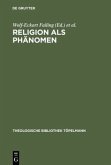Die liberale Sicht auf Religion und Kirche stimmt nicht mehr. Das zeigen jetzt auch die Ergebnisse der 5. Kirchenmitgliedschaftsuntersuchung der EKD. Die Zeiten, in denen man unwidersprochen behaupten konnte, alle Menschen hätten eigentlich religiöse Interessen und der Geltungsverlust der Kirche läge an ihren 'überholten dogmatischen' Auffassungen, sind vorbei. Religiöse Kommunikation findet sich ohne Kirche so gut wie gar nicht mehr.
Am Ende der Skala kirchlichen Bindungsverhaltens stehen also nicht neue Formen des Religiösen, sondern es findet sich schlicht Indifferenz. Deshalb fordert Gerhard Wegner ein Umdenken, wenn die Kirchenbindung nicht weiter erodieren soll. Die Kraft des Religiösen muss wieder selbstbewusster in das Zentrum kirchlicher Arbeit gestellt werden. Damit rücken Kirchengemeinden, religiöse Gemeinschaftsformen, Charismatiker als Innovatoren - alles letztlich kommunitaristische Konzepte - in den Vordergrund. Wegners Überlegungen helfen, diesen Wandel besser verstehen und gestalten zu können.
[Religious Communication and Ecclesial Commitment. The End of the Liberal Paradigm]
The liberal view on religion and church is no longer correct. This is revealed for instance by the results of the fifth study on church membership of the EKD. The times are gone when it could be argued without opposition that basically all people have religious interests and that the loss of importance of the church is due to its dogmatics and its authoritarian style. Of course, there is still a distinction between religion and church but religious communication without the church - or to be more precise, without church congregations - is nearly non-existent.
Therefore a change of thinking is needed if we don't want a further degradation of the commitment to the church.
Am Ende der Skala kirchlichen Bindungsverhaltens stehen also nicht neue Formen des Religiösen, sondern es findet sich schlicht Indifferenz. Deshalb fordert Gerhard Wegner ein Umdenken, wenn die Kirchenbindung nicht weiter erodieren soll. Die Kraft des Religiösen muss wieder selbstbewusster in das Zentrum kirchlicher Arbeit gestellt werden. Damit rücken Kirchengemeinden, religiöse Gemeinschaftsformen, Charismatiker als Innovatoren - alles letztlich kommunitaristische Konzepte - in den Vordergrund. Wegners Überlegungen helfen, diesen Wandel besser verstehen und gestalten zu können.
[Religious Communication and Ecclesial Commitment. The End of the Liberal Paradigm]
The liberal view on religion and church is no longer correct. This is revealed for instance by the results of the fifth study on church membership of the EKD. The times are gone when it could be argued without opposition that basically all people have religious interests and that the loss of importance of the church is due to its dogmatics and its authoritarian style. Of course, there is still a distinction between religion and church but religious communication without the church - or to be more precise, without church congregations - is nearly non-existent.
Therefore a change of thinking is needed if we don't want a further degradation of the commitment to the church.




